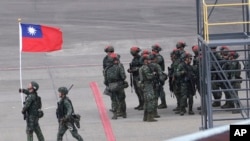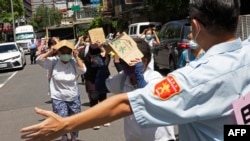Taiwan hosts a series of military exercises and drills next week that will include preventing attacks on key airports and ports, and testing the ability of troops to respond to scenarios similar to a hypothetical invasion from China.
Taiwan’s Ministry of National Defense says the annual Han Kuang and Wan An exercises, between July 22 and July 26, will focus on “unscripted and real combat drills.” They will include drills such as shelter-in-place and air defense drill alerts.
The exercises come as China increases military pressure on Taiwan, which Beijing views as part of its territory. Beijing has vowed to unify the democratically ruled island with China, by force if necessary.
When Taiwan President Lai Ching-te took office in May, China conducted a blockade-style military exercise around Taiwan, aimed at testing its ability to “seize power.” Beijing has also increased the number of military aircraft, naval vessels and coast guard vessels operating near Taiwan.
On July 11, Taiwan’s defense ministry said it detected 66 Chinese military aircraft operating around the island within 24 hours, the most sorties on a single day in 2024. A day before, Taipei said it detected China’s aircraft carrier Shandong sailing through waters near Taiwan to join military exercises in the western Pacific.
Unscripted drills
Unlike Han Kuang exercises in the past, some analysts say this year’s exercises will be closer to actual combat as authorities will not announce simulated scenarios before the exercises.
“This year’s drills are unscripted exercises and the goal is to let the Taiwanese military develop capabilities to respond swiftly in real combats,” Su Tzu-yun, a military expert at the Taipei-based Institute for National Defense and Security Research, told VOA by phone.
He said another aim of the drills is to boost troop morale and the public’s confidence in the military’s capabilities.
During the live-fire segment of the exercises, the defense ministry will test the troops’ defense capabilities during nighttime to ensure they can make decisions independently and follow the rules of engagement even after losing contact with central command.
“As the Chinese military enhances its combat capabilities at night, Taiwanese troops also need to possess the ability to be prepared to fight at any hour of the day,” said Chieh Chung, a military researcher at the National Policy Foundation in Taiwan.
Since the Chinese military may try to disrupt communication between the Taiwanese troops through large-scale information and electronic warfare, Chieh told VOA that it’s important for Taiwan to ensure its forces “have the capabilities and will to fight independently in combat when they lose contact with central command.”
To prevent invading Chinese troops from seizing critical infrastructure across Taiwan, the military will conduct anti-landing drills at 12 airports, ports, and beaches near key political and economic centers.
Apart from Taiwan’s main international airport in Taoyuan, the harbor at the mouth of the Tamsui River in northern Taiwan will be another important location where the Taiwanese military will conduct a river defense exercise, after a Chinese man drove a speedboat into the harbor in June.
China has increasingly deployed fighter jets and aircraft carrier groups toward eastern Taiwan, an area traditionally used to protect Taiwanese troops and home to two important air bases. In response, this year’s exercise will include runway repair, restoration of combat power, and air force countermeasures.
Su said the drills aim to ensure the Taiwanese military is capable of conducting “multi-point simultaneous defense” rather than concentrating on defending one particular item of infrastructure.
“These exercises are simulated based on a potential Chinese military invasion, during which the Chinese troops may likely focus on seizing airports, seaports, and beaches around Taiwan,” he told VOA.
Strengthening civil defense
Apart from strengthening Taiwanese troops’ capabilities in actual combat, Taiwan will also conduct the annual air defense exercise across the island.
While last year’s drills focused on shelter-in-place and evacuation drills in districts, this year’s air defense exercise will include the dissemination of alerts about missile and rocket attacks.
According to Taiwan’s Defense Ministry, alerts will be sent to Taiwanese people through text messages. The messages will include links to maps that inform them about the locations of nearby shelters.
In addition to the regular 30-minute drills, during which people need to shelter in place and vehicles have to stop moving, local governments and civil defense organizations will conduct a separate 30-minute drill setting up wartime disaster relief and shelter stations.
This year’s exercise will also simulate storing ammunition in strategic, underground places near battlefields as part of the effort to strengthen Taiwanese troops’ sustainability during combat. The ministry said this could reduce the risks of ammunition being damaged during combat while enhancing the troops’ combat sustainability.
Su said while Taiwan’s air raid shelters are already well-equipped, Taiwanese authorities should consider drawing up plans to transform some shelters into hospitals or spaces to store essential supplies. “These steps can further strengthen Taiwan’s civil defense,” he told VOA.
Some analysts say that while this year’s exercises reflect Taiwan’s attempt to modernize the training schemes, it’s important for the military to keep adjusting the exercises based on patterns emerging from China’s military activities.

